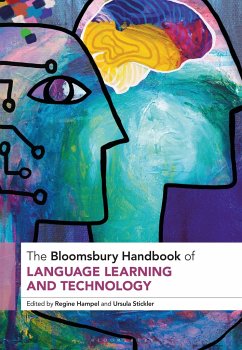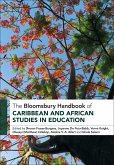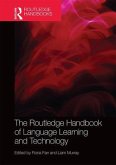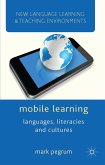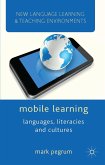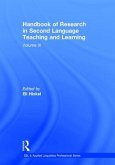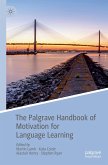The Bloomsbury Handbook of Language Learning and Technology
Herausgeber: Hampel, Regine; Stickler, Ursula
The Bloomsbury Handbook of Language Learning and Technology
Herausgeber: Hampel, Regine; Stickler, Ursula
- Gebundenes Buch
- Merkliste
- Auf die Merkliste
- Bewerten Bewerten
- Teilen
- Produkt teilen
- Produkterinnerung
- Produkterinnerung
This handbook draws together international perspectives on technology and its application to language teaching and learning, written and edited by leading scholars in the field. It meets the increasing demand for pedagogically-informed online language instruction, which is particularly important in the context of the effects that the Covid-19 pandemic has had on the education sector on a global scale, as well as exploring language learning in informal and non-formal contexts. With contributions from5 continents and over 20 countries, including Australia, Canada, Cyprus, Denmark, Finland,…mehr
Andere Kunden interessierten sich auch für
![The Bloomsbury Handbook of Caribbean and African Studies in Education The Bloomsbury Handbook of Caribbean and African Studies in Education]() The Bloomsbury Handbook of Caribbean and African Studies in Education226,99 €
The Bloomsbury Handbook of Caribbean and African Studies in Education226,99 €![The Routledge Handbook of Language Learning and Technology The Routledge Handbook of Language Learning and Technology]() The Routledge Handbook of Language Learning and Technology371,99 €
The Routledge Handbook of Language Learning and Technology371,99 €![Mobile Learning Mobile Learning]() M. PegrumMobile Learning74,99 €
M. PegrumMobile Learning74,99 €![Mobile Learning Mobile Learning]() M. PegrumMobile Learning74,99 €
M. PegrumMobile Learning74,99 €![Handbook of Research in Second Language Teaching and Learning Handbook of Research in Second Language Teaching and Learning]() Handbook of Research in Second Language Teaching and Learning417,99 €
Handbook of Research in Second Language Teaching and Learning417,99 €![The Routledge Handbook of Teaching English as an International Language The Routledge Handbook of Teaching English as an International Language]() The Routledge Handbook of Teaching English as an International Language320,99 €
The Routledge Handbook of Teaching English as an International Language320,99 €![The Palgrave Handbook of Motivation for Language Learning The Palgrave Handbook of Motivation for Language Learning]() The Palgrave Handbook of Motivation for Language Learning168,99 €
The Palgrave Handbook of Motivation for Language Learning168,99 €-
-
-
This handbook draws together international perspectives on technology and its application to language teaching and learning, written and edited by leading scholars in the field. It meets the increasing demand for pedagogically-informed online language instruction, which is particularly important in the context of the effects that the Covid-19 pandemic has had on the education sector on a global scale, as well as exploring language learning in informal and non-formal contexts. With contributions from5 continents and over 20 countries, including Australia, Canada, Cyprus, Denmark, Finland, France, Greece, Ireland, Japan, Spain, Sweden, the Netherlands, the UK and the USA, the book offers a thorough overview of the main influential theories and explores technology tools, approaches to research, and applications to practice. Carefully curated, this is an innovative and exciting volume for students, teachers, researchers and lecturers in language education.
Hinweis: Dieser Artikel kann nur an eine deutsche Lieferadresse ausgeliefert werden.
Hinweis: Dieser Artikel kann nur an eine deutsche Lieferadresse ausgeliefert werden.
Produktdetails
- Produktdetails
- Verlag: Taylor & Francis Ltd (Sales)
- Seitenzahl: 512
- Erscheinungstermin: 25. Juli 2024
- Englisch
- Abmessung: 244mm x 169mm x 25mm
- Gewicht: 454g
- ISBN-13: 9781350340329
- ISBN-10: 1350340324
- Artikelnr.: 68584126
- Herstellerkennzeichnung
- Produktsicherheitsverantwortliche/r
- Europaallee 1
- 36244 Bad Hersfeld
- gpsr@libri.de
- Verlag: Taylor & Francis Ltd (Sales)
- Seitenzahl: 512
- Erscheinungstermin: 25. Juli 2024
- Englisch
- Abmessung: 244mm x 169mm x 25mm
- Gewicht: 454g
- ISBN-13: 9781350340329
- ISBN-10: 1350340324
- Artikelnr.: 68584126
- Herstellerkennzeichnung
- Produktsicherheitsverantwortliche/r
- Europaallee 1
- 36244 Bad Hersfeld
- gpsr@libri.de
Regine Hampel is Professor of Open and Distance Language Learning at the Open University, UK. Ursula Stickler is Senior Lecturer in German at the Open University, UK.
Introduction
Regine Hampel and Ursula Stickler (Open University
UK) Part I: CALL through the Ages 1. The Formative Years through an early CALL Journal
Mike Levy (Queensland University
Australia) 2. Technologies
Tools and Tutors
Phil Hubbard (Stanford University
USA) 3. Tutorial CALL - Language Practice with the Computer
Mathias Schulze (San Diego State University
USA) 4. Impact of the Pandemic on Language Education: Voices from across the World
Aline Germain-Rutherford
Banafsheh Karamifar
Emerita Bañados
Pauline Ernest
Sarah Heiser
Joe Hopkins
Tomás Klinka
Mohamad Rahimi
Jackie Robbins and Klára Ulicná (Ottawa University
Canada; Universidad de Concepción
Chile
Universitat Oberta de Catalunya
Spain; The Open University
UK; Charles University
Czech Republic; Shiraz University
Iran) Part II: Theories in CALL 5. Second Language Acquisition Theories and TELL
Carol Chapelle (Iowa State University
USA) 6. Sociocultural Theory
Stefan Rathert (Kahramanmaras Sütçü Imam University
Turkey) and Nese Cabaroglu (Çukurova University
Turkey) 7. Multimodal Communication
Styliani Karatza (National and Kapodistrian University of Athens
Greece) and Elisabetta Adami (University of Leeds
UK) 8. (Multi-)Literacies
Anastasia O. Tzirides
Mary Kalantzis
Bill Cope and Vania Castro (University of Illinois
USA) 9. Ecological Perspectives on CALL
Regine Hampel (Open University
UK) 10. Motivation and Autonomy
Glenn Stockwell and Yijen Wang (Waseda University
Japan) 11. Social Media and Intercultural Competence
Jonathon Reinhardt (University of Arizona
USA) Part III: Digital and Online Technologies Transforming Learning and Teaching 12. Digital Screen Mediation in Language Teaching
Carla Meskill (University of Albany
USA) 13. MOOCs for Language Learning
Elena Martin-Monje (UNED Madrid
Spain) 14. Machine Translation in Language Learning
Teaching and Assessment
Karina von Lindeiner-Stráský and Andrew Gargett (Open University
UK) 15. Data-Driven Language Learning
Alex Boulton (Université de Lorraine
France) and Pascual Pérez-Paredes (Universidad de Murcia
Spain) 16. Augmented and Virtual Reality in CALL
Stella Hadjistassou and Maria Iosifina Avgousti (University of Cyprus
Cyprus) 17. Maker Culture and Design
Sébastien Dubreil and Stephan Caspar (Carnegie Mellon University
USA) Part IV: Moving the Learner Online 18.Virtual Exchange as a Tool for Intercultural Communicative Competence Development in Contemporary Foreign Language Education
Linda Gijsen
Silvia Canto and Kristi Jauregi-Ondarra (Utrecht University
the Netherlands) 19. Social Presence in Multimodal Virtual Exchange and Online Teaching
Müge Satar (Newcastle University
UK) 20.Translingual Online Identities
Emotionality and Pedagogy
Sender Dovchin
Stephanie Dryden and Ana Tankosic (Curtin University
Australia) 21. A Hopeful Future for Mobile Language Learning
Agnes Kukulska-Hulme (Open University
UK) 22. Critical CALL: Towards Social Justice and Equity in Language Education
Liudmila Klimanova (University of Arizona
USA) and Kathryn Murphy-Judy (Virginia Commonwealth University
USA) Part V: Research Methodologies and Methods 23. Activity Theory and CALL
Françoise Blin
Aparajita Dey-Plissonneau (Dublin City University
Ireland) and Sagun Shrestha (Open University
UK) 24. A Translanguaging and Multimodal Approach to Video-Mediated 'Street Language Learning'
Maria Grazia Sindoni (University of Messina
Italy) and Wing Yee Jenifer Ho (Hong Kong Polytechnic University
Hong Kong) 25. Reconceptualizing Negotiation of Meaning as Multimodal in Desktop and Mobile Videoconferencing
Helen Lee (Open University
UK) 26. Doing N/Ethnography in the Nexus of Language Learning and Technology: Trends and Looking Ahead
Sangeeta Bagga-Gupta (Jönköping University
Sweden) and Sylvi Vigmo (Gothenburg University
Sweden) 27. Social Network Theory for Language Education Research
Martina Emke (Fachhochschule Bielefeld
Germany) and Olivia Kelly (Open University
UK) 28. Participant-Focused Eyetracking in a Sociocultural Framework
Ursula Stickler (Open University
UK) and Lijing Shi (London School of Economics
UK) Part VI: Teachers' Needs and Initiatives 29. Hybridization in the K-12 Educational Context and CALL for a Digital and Post-Pandemic Era
Martine Pellerin (University of Alberta
USA) 30. Digital Multimodal Pedagogy for Teacher Training
Mimi Li (Texas A&M University-Commerce
USA) and Lianjiang Jiang (University of Hong Kong
Hong Kong) 31. Tips for Teachers
All Authors Conclusion
Regine Hampel and Ursula Stickler (Open University
UK) Index
Regine Hampel and Ursula Stickler (Open University
UK) Part I: CALL through the Ages 1. The Formative Years through an early CALL Journal
Mike Levy (Queensland University
Australia) 2. Technologies
Tools and Tutors
Phil Hubbard (Stanford University
USA) 3. Tutorial CALL - Language Practice with the Computer
Mathias Schulze (San Diego State University
USA) 4. Impact of the Pandemic on Language Education: Voices from across the World
Aline Germain-Rutherford
Banafsheh Karamifar
Emerita Bañados
Pauline Ernest
Sarah Heiser
Joe Hopkins
Tomás Klinka
Mohamad Rahimi
Jackie Robbins and Klára Ulicná (Ottawa University
Canada; Universidad de Concepción
Chile
Universitat Oberta de Catalunya
Spain; The Open University
UK; Charles University
Czech Republic; Shiraz University
Iran) Part II: Theories in CALL 5. Second Language Acquisition Theories and TELL
Carol Chapelle (Iowa State University
USA) 6. Sociocultural Theory
Stefan Rathert (Kahramanmaras Sütçü Imam University
Turkey) and Nese Cabaroglu (Çukurova University
Turkey) 7. Multimodal Communication
Styliani Karatza (National and Kapodistrian University of Athens
Greece) and Elisabetta Adami (University of Leeds
UK) 8. (Multi-)Literacies
Anastasia O. Tzirides
Mary Kalantzis
Bill Cope and Vania Castro (University of Illinois
USA) 9. Ecological Perspectives on CALL
Regine Hampel (Open University
UK) 10. Motivation and Autonomy
Glenn Stockwell and Yijen Wang (Waseda University
Japan) 11. Social Media and Intercultural Competence
Jonathon Reinhardt (University of Arizona
USA) Part III: Digital and Online Technologies Transforming Learning and Teaching 12. Digital Screen Mediation in Language Teaching
Carla Meskill (University of Albany
USA) 13. MOOCs for Language Learning
Elena Martin-Monje (UNED Madrid
Spain) 14. Machine Translation in Language Learning
Teaching and Assessment
Karina von Lindeiner-Stráský and Andrew Gargett (Open University
UK) 15. Data-Driven Language Learning
Alex Boulton (Université de Lorraine
France) and Pascual Pérez-Paredes (Universidad de Murcia
Spain) 16. Augmented and Virtual Reality in CALL
Stella Hadjistassou and Maria Iosifina Avgousti (University of Cyprus
Cyprus) 17. Maker Culture and Design
Sébastien Dubreil and Stephan Caspar (Carnegie Mellon University
USA) Part IV: Moving the Learner Online 18.Virtual Exchange as a Tool for Intercultural Communicative Competence Development in Contemporary Foreign Language Education
Linda Gijsen
Silvia Canto and Kristi Jauregi-Ondarra (Utrecht University
the Netherlands) 19. Social Presence in Multimodal Virtual Exchange and Online Teaching
Müge Satar (Newcastle University
UK) 20.Translingual Online Identities
Emotionality and Pedagogy
Sender Dovchin
Stephanie Dryden and Ana Tankosic (Curtin University
Australia) 21. A Hopeful Future for Mobile Language Learning
Agnes Kukulska-Hulme (Open University
UK) 22. Critical CALL: Towards Social Justice and Equity in Language Education
Liudmila Klimanova (University of Arizona
USA) and Kathryn Murphy-Judy (Virginia Commonwealth University
USA) Part V: Research Methodologies and Methods 23. Activity Theory and CALL
Françoise Blin
Aparajita Dey-Plissonneau (Dublin City University
Ireland) and Sagun Shrestha (Open University
UK) 24. A Translanguaging and Multimodal Approach to Video-Mediated 'Street Language Learning'
Maria Grazia Sindoni (University of Messina
Italy) and Wing Yee Jenifer Ho (Hong Kong Polytechnic University
Hong Kong) 25. Reconceptualizing Negotiation of Meaning as Multimodal in Desktop and Mobile Videoconferencing
Helen Lee (Open University
UK) 26. Doing N/Ethnography in the Nexus of Language Learning and Technology: Trends and Looking Ahead
Sangeeta Bagga-Gupta (Jönköping University
Sweden) and Sylvi Vigmo (Gothenburg University
Sweden) 27. Social Network Theory for Language Education Research
Martina Emke (Fachhochschule Bielefeld
Germany) and Olivia Kelly (Open University
UK) 28. Participant-Focused Eyetracking in a Sociocultural Framework
Ursula Stickler (Open University
UK) and Lijing Shi (London School of Economics
UK) Part VI: Teachers' Needs and Initiatives 29. Hybridization in the K-12 Educational Context and CALL for a Digital and Post-Pandemic Era
Martine Pellerin (University of Alberta
USA) 30. Digital Multimodal Pedagogy for Teacher Training
Mimi Li (Texas A&M University-Commerce
USA) and Lianjiang Jiang (University of Hong Kong
Hong Kong) 31. Tips for Teachers
All Authors Conclusion
Regine Hampel and Ursula Stickler (Open University
UK) Index
Introduction
Regine Hampel and Ursula Stickler (Open University
UK) Part I: CALL through the Ages 1. The Formative Years through an early CALL Journal
Mike Levy (Queensland University
Australia) 2. Technologies
Tools and Tutors
Phil Hubbard (Stanford University
USA) 3. Tutorial CALL - Language Practice with the Computer
Mathias Schulze (San Diego State University
USA) 4. Impact of the Pandemic on Language Education: Voices from across the World
Aline Germain-Rutherford
Banafsheh Karamifar
Emerita Bañados
Pauline Ernest
Sarah Heiser
Joe Hopkins
Tomás Klinka
Mohamad Rahimi
Jackie Robbins and Klára Ulicná (Ottawa University
Canada; Universidad de Concepción
Chile
Universitat Oberta de Catalunya
Spain; The Open University
UK; Charles University
Czech Republic; Shiraz University
Iran) Part II: Theories in CALL 5. Second Language Acquisition Theories and TELL
Carol Chapelle (Iowa State University
USA) 6. Sociocultural Theory
Stefan Rathert (Kahramanmaras Sütçü Imam University
Turkey) and Nese Cabaroglu (Çukurova University
Turkey) 7. Multimodal Communication
Styliani Karatza (National and Kapodistrian University of Athens
Greece) and Elisabetta Adami (University of Leeds
UK) 8. (Multi-)Literacies
Anastasia O. Tzirides
Mary Kalantzis
Bill Cope and Vania Castro (University of Illinois
USA) 9. Ecological Perspectives on CALL
Regine Hampel (Open University
UK) 10. Motivation and Autonomy
Glenn Stockwell and Yijen Wang (Waseda University
Japan) 11. Social Media and Intercultural Competence
Jonathon Reinhardt (University of Arizona
USA) Part III: Digital and Online Technologies Transforming Learning and Teaching 12. Digital Screen Mediation in Language Teaching
Carla Meskill (University of Albany
USA) 13. MOOCs for Language Learning
Elena Martin-Monje (UNED Madrid
Spain) 14. Machine Translation in Language Learning
Teaching and Assessment
Karina von Lindeiner-Stráský and Andrew Gargett (Open University
UK) 15. Data-Driven Language Learning
Alex Boulton (Université de Lorraine
France) and Pascual Pérez-Paredes (Universidad de Murcia
Spain) 16. Augmented and Virtual Reality in CALL
Stella Hadjistassou and Maria Iosifina Avgousti (University of Cyprus
Cyprus) 17. Maker Culture and Design
Sébastien Dubreil and Stephan Caspar (Carnegie Mellon University
USA) Part IV: Moving the Learner Online 18.Virtual Exchange as a Tool for Intercultural Communicative Competence Development in Contemporary Foreign Language Education
Linda Gijsen
Silvia Canto and Kristi Jauregi-Ondarra (Utrecht University
the Netherlands) 19. Social Presence in Multimodal Virtual Exchange and Online Teaching
Müge Satar (Newcastle University
UK) 20.Translingual Online Identities
Emotionality and Pedagogy
Sender Dovchin
Stephanie Dryden and Ana Tankosic (Curtin University
Australia) 21. A Hopeful Future for Mobile Language Learning
Agnes Kukulska-Hulme (Open University
UK) 22. Critical CALL: Towards Social Justice and Equity in Language Education
Liudmila Klimanova (University of Arizona
USA) and Kathryn Murphy-Judy (Virginia Commonwealth University
USA) Part V: Research Methodologies and Methods 23. Activity Theory and CALL
Françoise Blin
Aparajita Dey-Plissonneau (Dublin City University
Ireland) and Sagun Shrestha (Open University
UK) 24. A Translanguaging and Multimodal Approach to Video-Mediated 'Street Language Learning'
Maria Grazia Sindoni (University of Messina
Italy) and Wing Yee Jenifer Ho (Hong Kong Polytechnic University
Hong Kong) 25. Reconceptualizing Negotiation of Meaning as Multimodal in Desktop and Mobile Videoconferencing
Helen Lee (Open University
UK) 26. Doing N/Ethnography in the Nexus of Language Learning and Technology: Trends and Looking Ahead
Sangeeta Bagga-Gupta (Jönköping University
Sweden) and Sylvi Vigmo (Gothenburg University
Sweden) 27. Social Network Theory for Language Education Research
Martina Emke (Fachhochschule Bielefeld
Germany) and Olivia Kelly (Open University
UK) 28. Participant-Focused Eyetracking in a Sociocultural Framework
Ursula Stickler (Open University
UK) and Lijing Shi (London School of Economics
UK) Part VI: Teachers' Needs and Initiatives 29. Hybridization in the K-12 Educational Context and CALL for a Digital and Post-Pandemic Era
Martine Pellerin (University of Alberta
USA) 30. Digital Multimodal Pedagogy for Teacher Training
Mimi Li (Texas A&M University-Commerce
USA) and Lianjiang Jiang (University of Hong Kong
Hong Kong) 31. Tips for Teachers
All Authors Conclusion
Regine Hampel and Ursula Stickler (Open University
UK) Index
Regine Hampel and Ursula Stickler (Open University
UK) Part I: CALL through the Ages 1. The Formative Years through an early CALL Journal
Mike Levy (Queensland University
Australia) 2. Technologies
Tools and Tutors
Phil Hubbard (Stanford University
USA) 3. Tutorial CALL - Language Practice with the Computer
Mathias Schulze (San Diego State University
USA) 4. Impact of the Pandemic on Language Education: Voices from across the World
Aline Germain-Rutherford
Banafsheh Karamifar
Emerita Bañados
Pauline Ernest
Sarah Heiser
Joe Hopkins
Tomás Klinka
Mohamad Rahimi
Jackie Robbins and Klára Ulicná (Ottawa University
Canada; Universidad de Concepción
Chile
Universitat Oberta de Catalunya
Spain; The Open University
UK; Charles University
Czech Republic; Shiraz University
Iran) Part II: Theories in CALL 5. Second Language Acquisition Theories and TELL
Carol Chapelle (Iowa State University
USA) 6. Sociocultural Theory
Stefan Rathert (Kahramanmaras Sütçü Imam University
Turkey) and Nese Cabaroglu (Çukurova University
Turkey) 7. Multimodal Communication
Styliani Karatza (National and Kapodistrian University of Athens
Greece) and Elisabetta Adami (University of Leeds
UK) 8. (Multi-)Literacies
Anastasia O. Tzirides
Mary Kalantzis
Bill Cope and Vania Castro (University of Illinois
USA) 9. Ecological Perspectives on CALL
Regine Hampel (Open University
UK) 10. Motivation and Autonomy
Glenn Stockwell and Yijen Wang (Waseda University
Japan) 11. Social Media and Intercultural Competence
Jonathon Reinhardt (University of Arizona
USA) Part III: Digital and Online Technologies Transforming Learning and Teaching 12. Digital Screen Mediation in Language Teaching
Carla Meskill (University of Albany
USA) 13. MOOCs for Language Learning
Elena Martin-Monje (UNED Madrid
Spain) 14. Machine Translation in Language Learning
Teaching and Assessment
Karina von Lindeiner-Stráský and Andrew Gargett (Open University
UK) 15. Data-Driven Language Learning
Alex Boulton (Université de Lorraine
France) and Pascual Pérez-Paredes (Universidad de Murcia
Spain) 16. Augmented and Virtual Reality in CALL
Stella Hadjistassou and Maria Iosifina Avgousti (University of Cyprus
Cyprus) 17. Maker Culture and Design
Sébastien Dubreil and Stephan Caspar (Carnegie Mellon University
USA) Part IV: Moving the Learner Online 18.Virtual Exchange as a Tool for Intercultural Communicative Competence Development in Contemporary Foreign Language Education
Linda Gijsen
Silvia Canto and Kristi Jauregi-Ondarra (Utrecht University
the Netherlands) 19. Social Presence in Multimodal Virtual Exchange and Online Teaching
Müge Satar (Newcastle University
UK) 20.Translingual Online Identities
Emotionality and Pedagogy
Sender Dovchin
Stephanie Dryden and Ana Tankosic (Curtin University
Australia) 21. A Hopeful Future for Mobile Language Learning
Agnes Kukulska-Hulme (Open University
UK) 22. Critical CALL: Towards Social Justice and Equity in Language Education
Liudmila Klimanova (University of Arizona
USA) and Kathryn Murphy-Judy (Virginia Commonwealth University
USA) Part V: Research Methodologies and Methods 23. Activity Theory and CALL
Françoise Blin
Aparajita Dey-Plissonneau (Dublin City University
Ireland) and Sagun Shrestha (Open University
UK) 24. A Translanguaging and Multimodal Approach to Video-Mediated 'Street Language Learning'
Maria Grazia Sindoni (University of Messina
Italy) and Wing Yee Jenifer Ho (Hong Kong Polytechnic University
Hong Kong) 25. Reconceptualizing Negotiation of Meaning as Multimodal in Desktop and Mobile Videoconferencing
Helen Lee (Open University
UK) 26. Doing N/Ethnography in the Nexus of Language Learning and Technology: Trends and Looking Ahead
Sangeeta Bagga-Gupta (Jönköping University
Sweden) and Sylvi Vigmo (Gothenburg University
Sweden) 27. Social Network Theory for Language Education Research
Martina Emke (Fachhochschule Bielefeld
Germany) and Olivia Kelly (Open University
UK) 28. Participant-Focused Eyetracking in a Sociocultural Framework
Ursula Stickler (Open University
UK) and Lijing Shi (London School of Economics
UK) Part VI: Teachers' Needs and Initiatives 29. Hybridization in the K-12 Educational Context and CALL for a Digital and Post-Pandemic Era
Martine Pellerin (University of Alberta
USA) 30. Digital Multimodal Pedagogy for Teacher Training
Mimi Li (Texas A&M University-Commerce
USA) and Lianjiang Jiang (University of Hong Kong
Hong Kong) 31. Tips for Teachers
All Authors Conclusion
Regine Hampel and Ursula Stickler (Open University
UK) Index

